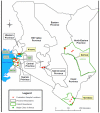Cash transfer programme, productive activities and labour supply: Evidence from randomized experiment in Kenya
- PMID: 25663712
- PMCID: PMC4316733
- DOI: 10.1080/00220388.2014.919383
Cash transfer programme, productive activities and labour supply: Evidence from randomized experiment in Kenya
Abstract
This paper reports analysis of the impact of Kenya's Cash Transfer for Orphans and Vulnerable Children Programme on the household decisions on productive activities using data from a randomized experimental design. Results show that the programme had a positive and significant impact on food consumption coming from home production, accumulation of productive assets, especially on the ownership of small livestock and on formation of nonfarm enterprise, especially for females. The programme has provided more flexibility to families in terms of labour allocation decisions, particularly for those who are geographically isolated. The programme was also found to have reduced child labour, an important objective of the programme. However we find very little impact of the programme on direct indicators of crop production.
Keywords: Kenya; cash transfers; difference in difference; impact evaluation; productive impact; propensity score.
Figures




References
-
- Alzúa ML, Cruces G, Ripani L. Welfare Programs and Labor Supply in Developing Countries: Experimental Evidence from Latin America. Centro de Estudios Distributivos, Laborales y Sociales, Universidad Nacional de La Plata; 2010. Documento de Trabajo No. 95.
-
- Barrientos A, DeJong J. Child Poverty and Cash Transfers. Report 4. Childhood Poverty Research and Policy Centre; London: 2004.
-
- Becker G. A Theory of the Allocation of Time. The Economic Journal. 1965;299(75):493–517.
-
- Berhane G, Hoddinott J, Kumar N, Taffesse AS. The impact of Ethiopia’s productive safety nets and household asset building programme: 2006-2010. IFPRI; Washington DC., USA: 2011.
Grants and funding
LinkOut - more resources
Full Text Sources
Other Literature Sources
